University Course Instruction
CURRENT COURSES AT THE UNIVERSITY OF MAINE
SFR 349 Applied Forest Ecology and Silviculture
This Fall Term course is intended for non-forestry majors. We will discuss forest ecology and silvicultural techniques in the context of wildlife ecology and management, especially as relates to habitat creation and maintenance of biodiversity.
This Fall Term course is intended for non-forestry majors. We will discuss forest ecology and silvicultural techniques in the context of wildlife ecology and management, especially as relates to habitat creation and maintenance of biodiversity.
WLE 431 Wildlife Management in Forestry
This Spring Term course is intended for non-wildlife ecology majors. We are in an era of managing forests for multiple uses. This often requires understanding how forest management options affect wildlife assemblages, biodiversity, and habitat. We will discuss the application and trade-offs of silvicultural techniques and management approaches for the creation of wildlife habitat, maintenance of biodiversity, and benefit of target wildlife species.
This Spring Term course is intended for non-wildlife ecology majors. We are in an era of managing forests for multiple uses. This often requires understanding how forest management options affect wildlife assemblages, biodiversity, and habitat. We will discuss the application and trade-offs of silvicultural techniques and management approaches for the creation of wildlife habitat, maintenance of biodiversity, and benefit of target wildlife species.
WLE 650 Wildlife Science in Forest Planning
For Spring Term (odd years) graduate course, students integrate concepts and ideas from wildlife and fish science, forest management and planning, adaptive management, and translational ecology to address landowner objectives to conserve biodiversity, aid declining wildlife species, and maintain ecosystem integrity of forest systems. Students use science-based knowledge to focus on management practices, comparison of management options, and government guidance for managing forest resources to meet wildlife, fish, and biodiversity objectives.
For Spring Term (odd years) graduate course, students integrate concepts and ideas from wildlife and fish science, forest management and planning, adaptive management, and translational ecology to address landowner objectives to conserve biodiversity, aid declining wildlife species, and maintain ecosystem integrity of forest systems. Students use science-based knowledge to focus on management practices, comparison of management options, and government guidance for managing forest resources to meet wildlife, fish, and biodiversity objectives.
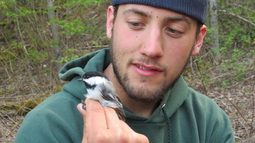
WLE 250 Wildlife Field Survey
This May Term course focuses on wildlife field techniques and research methods. This course is team-taught, and my component of the course focuses on bird inventory and research techniques.
This May Term course focuses on wildlife field techniques and research methods. This course is team-taught, and my component of the course focuses on bird inventory and research techniques.
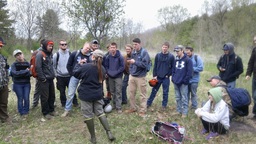
SFR 397 Forest Inventory & Certification
As a guest lecturer for this May Term course, I demonstrate field techniques for wildlife inventory and assessment. We tour a variety of forest stands to discuss how silvicultural practices can create habitat for a variety of wildlife species.
As a guest lecturer for this May Term course, I demonstrate field techniques for wildlife inventory and assessment. We tour a variety of forest stands to discuss how silvicultural practices can create habitat for a variety of wildlife species.
PREVIOUS COURSES TAUGHT
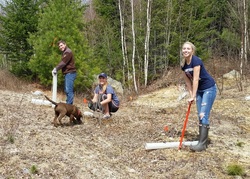
WLE 230 Introduction to Wildlife Conservation
In Spring 2016, I taught an undergraduate course in wildlife conservation at the University of Maine. The focus of this class was to introduce students who are not Wildlife Ecology majors to wildlife biology principles, scientific approaches to understanding conservation problems, wildlife conservation problems and solutions, and the social, cultural, and political institutions affecting wildlife.
In Spring 2016, I taught an undergraduate course in wildlife conservation at the University of Maine. The focus of this class was to introduce students who are not Wildlife Ecology majors to wildlife biology principles, scientific approaches to understanding conservation problems, wildlife conservation problems and solutions, and the social, cultural, and political institutions affecting wildlife.
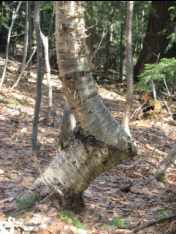
Dendrology and Silvics
In 2013 and 2014, I taught Vegetation of North America, a course where woody plant identification and forest communities are the emphasis, at Michigan Tech. Students learn to identify dominant tree and shrub species to prepare them for courses in forest ecology, silviculture, and field techniques. By understanding the silvics and ecology of these species, students are taught that understanding trees is more than just being able to identify them.
In 2013 and 2014, I taught Vegetation of North America, a course where woody plant identification and forest communities are the emphasis, at Michigan Tech. Students learn to identify dominant tree and shrub species to prepare them for courses in forest ecology, silviculture, and field techniques. By understanding the silvics and ecology of these species, students are taught that understanding trees is more than just being able to identify them.
Conservation Biology
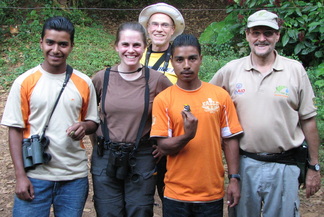
Golden-winged Warbler Survey Team in Nicaragua, 2010.
I taught lectures in Conservation Biology in 2007-2013 at Michigan Tech University. This course allowed me to share my personal conservation experiences with students and engage them in real-world scenarios they may encounter during their careers.
Ornithology
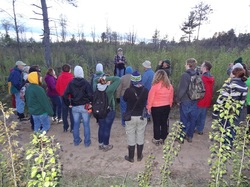 Photo: Courtesy of Jamie Nack
Photo: Courtesy of Jamie Nack
In Spring 2012, I was a teaching assistant for this course at Michigan Tech University. I especially enjoy teaching this subject because birds are an excellent portal into discussing broader ecological concepts, conservation issues affecting a diverse suite of species and ecosystems, and generally get students excited about science. Birds are everywhere in all habitats year-round which makes them a great subject for teaching especially in a place where winter extends to six months of the year.
Wildlife Habitat
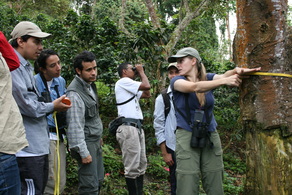
Forest mensuration training for biologists in Colombia.
I've presented lectures and field labs on this topic at Michigan Tech University, Iowa State University, and Northland College. In 2008, I co-taught a workshop for Latin American avian biologists in habitat measurement techniques and experimental design in Colombia, South America. Many habitat concepts and techniques can be taught and applied almost anywhere, as long as you can speak the language.
